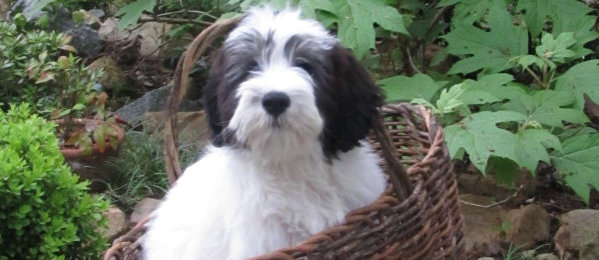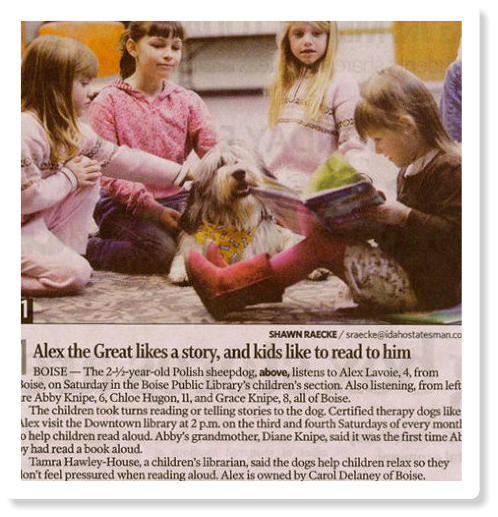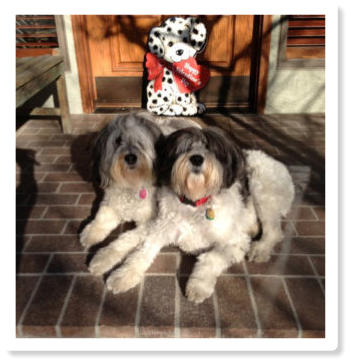






Home of Polish Lowland Sheepdogs
Therapy PONs
Alex the Great: Therapy Dog
By Carol Delaney

The second grade class at Morley Nelson Elementary School here will be the fifth class
to host weekly visits by Alex. He is now such a familiar four-footed visitor that as we
walk through the halls, nearly one-fourth of the school recognizes him as their former
“listening-dog”.
His visits are rigidly timed; we arrive precisely and leave quickly; his sessions are part of
the curriculum. Small groups [all named after birds, the namesake of the school was
the founder of the World Center for Birds of Prey, based in Idaho to study, foster and
preserve endangered raptors] are called ‘Doves’, ‘Peregrines’, ‘Robins’, etc. Each
group is of 5 or 6 who will read to Alex. I encourage them to read all at once, that Alex
can listen to all the stories, and to speak up so he can hear them all. That keeps the
restlessness down, and allows them full use of their special time. There is of course
some petting and distraction, but overall, they READ! The scores for this teacher’s
students have been consistently the highest in reading improvements in the second
grade classes. He is almost a Class Mascot.
We also visit the Public Library on Saturday for a program featuring two ‘Library Dogs’
from the Therapy Dog organization; books on dogs are set out for children to choose,
parents or siblings often help little ones by reading or older children choose a book for
each dog and read to him. We do this once a month, sometimes every other month,
usually together with Kaleb, a German Shepherd who always greets Alex with a loud,
deep bark, than settles down to wait for visitors. They are a great pair; Alex smaller,
softer and ‘fuzzier’ than Kaleb, who is majestic, ‘sphinxlike’!
We went to the training for the Therapy Dog program when Alex was just over one year
old, the youngest accepted. It was a rigorous training, requiring focus, showing a lack
of fear over loud noises and scary objects: wheelchairs, canes, walkers, clicking and
rolling devices, greeting strangers politely, and passing other dogs nearby who must be
ignored. He had recently passed his AKA Obedience test, so some things were familiar.
We passed the Therapy Dog test, then had three visits to a nursing home facility where
an observer followed us from room to room to allow residents who wished to visit to pet
him. He passed that too, and we could have just continued to visit the nursing centers,
but children are especially drawn to the PON... they are soft, shaggy, and non-threaten
ing, and enjoy being touched so it seemed natural to ‘work’ in schools and librarys.
There are requirements for him; a small annual fee, a badge [which I wear], a medallion
on his collar, and a vest or bandana worn only for these occasions. Alex has a number
of themed bandannas, and when they are on, he knows its time to go see the kids.
We are occasionally asked to visit a class of ‘special needs’ children; we start by
explaining how to greet a strange dog, how to approach, caution that not all dogs are
friendly or who might startle easily, caution also against trusting those teeth! that even
the gentlest dog can be provoked to bite. They take turns asking permission first, then
greeting Alex who sits quietly by my side. It is important for me [the ‘trainer’] to be alert
to potential problems.
One of the most heartwarming successes was with an 11 yr. old blind girl who had a
real fear of what a dog was and how to avoid it! Over a period of several weeks she
was carelfully guided to touch Alex, the fur on his side [away from the head], then
gradually she was brave enough to touch his face, sliding her hands over his ears,
eyes, and nose. The expression on her face brought tears to my eyes, and to her
teacher’s. Sadly, she soon after that was transferred to a different school and we have
lost track. I only hope another Therapy Dog will enter her life.
We are about to start our weekly visits to the second grade, a bran new group of eager
readers who will get to know and almost certainly love Alex while learning new skills,
especially the joy of reading, and especially.... to Alex the Great.
Note: Charley, little brother, was also licensed but was very nervous around small
children so had ‘retired’, but when Alex had to have ATL surgery last Fall, Charley
gamely filled in at class! He did so well, sniffing each face so he began to know each
one, that I had planned to start him at the Library as well. Sadly, he died suddenly, just
after the picture was taken, which features a Valentine Card from the class for Alex...
and for Charley.

Alex & Charley
American Polish Lowland Sheepdog Club













